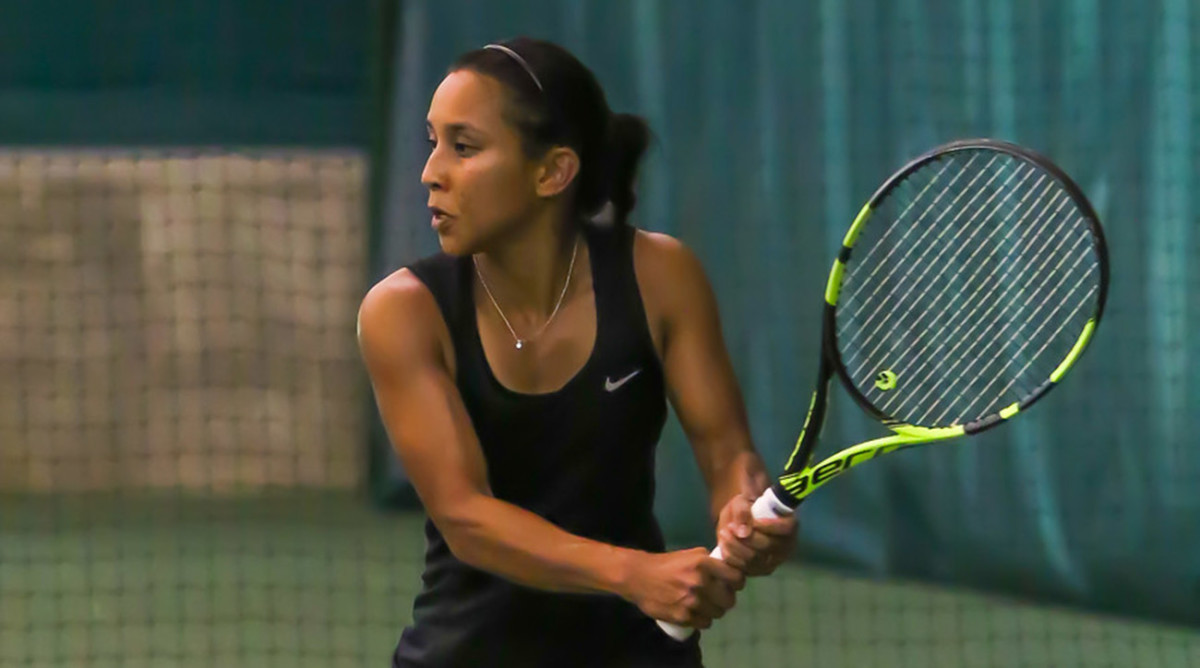Break Point: How Former Sportscenter Anchor Prim Siripipat Found Balance After ESPN

Prim Siripipat sits at a table in a Starbucks in Soho, mulling over how she wants to be remembered, her arm in a sling after undergoing shoulder surgery less than a month before.
“That’s a great question,” she says before taking a few contemplative breaths. She begins to answer, then cuts herself off again. “That’s a great question.”
Siripipat has been known for quite a few things during her career. She was a widely recognized tennis prodigy from a very young age. She was a highly touted Duke player who—despite losing most of her senior season to injury—managed to collect a 44-15 overall singles record and a 17-2 ACC singles record. She had dreams of going pro.

Then, suddenly, it was all gone. She underwent three surgeries during her senior year—a rotator cuff and two knees—and lost most of her fall and spring seasons. Eventually her interests turned to broadcasting, and she worked her way up from a producer at a news station in North Carolina to a SportsCenter anchor at ESPN. With a new career blossoming, thoughts of playing professional tennis dissipated. But, according to Siripipat, they never seemed to fully go away.
The woman who listed “winning a major tournament like the U.S. Open” in her Duke bio had become estranged from the game, taking a long hiatus from the sport. Siripipat had essentially refused to pick up a racket on a regular basis after her time at Duke and she even struggled being a spectator at matches. But in 2016, she felt an urge to get back into the game.
“I picked up a racket once in awhile but it was just too painful for me," she said. "I guess it was just a sense of bitterness a little bit and just going out and playing—especially if I go out and play recreationally and I can’t do the things I used to be able to do—it was just so frustrating and that’s why I probably stayed away from it.”
In Siripipat’s own opinion, she hadn’t lived up to expectations during her time at Duke. Retirement—especially at such a young age—is something so few athletes are prepared for. And Siripipat was no different. That is until 2016, when she decided that she wanted to begin playing at a high level again.

The moment came in May, at—of all places—the Cheesecake Factory, when Siripipat broke down into tears while eating with her husband, Ben Aronson. She realized how disappointed she was with the ending to her tennis career. She wanted to be able to write her own ending and do things better than the first time. That revelation evolved into “Second Life,” a documentary about Siripipat’s attempted return to tennis and what that could mean for her future. But her return didn't start out smoothly.
Siripipat began waking up before 5 a.m. to chronicle her efforts in a journal, meditate, eat breakfast and workout. After putting in a shift at ESPN, she’d go home and meet her strength and conditioning coach for her second training session of the day. During the training she tweaked her shoulder, likely because of her swift return, but a cortisone shot helped her continue on and make it to her first tournament, about a year later in Queens, N.Y.
The nerves immediately crept in. She felt sick and admitted that she’d forgotten how much of a challenge it was. But that competitive fire—constantly operating like a “total badass,” as Ryen Russillo describes it—soon took over. She made it to the finals of the tournament, eventually falling to the champion in three sets. But her thirst for competition had been piqued.
She soon jumped straight into a professional tournament, one that was being hosted by her former tennis academy in Saddlebrook, Fla. She lost in the first round of qualifying, in a marathon match that lasted two-plus hours. But an important lesson had been learned: Maybe jumping into a pro tournament—where she would be playing opposition that trained year-round and sat within the top 200 in the world—wasn't the best idea after more than a decade away from the sport. The shoulder injury that had followed her since Duke had reemerged, but she remained undeterred throughout several tournaments in Europe, even as the nagging pain persisted. But after a three-plus hour match in Poland, she could tell that the injury wasn’t getting better, and her usually strict and consistent training schedule grew sporadic.
It didn’t help that so much was changing around her. In April 2017, Siripipat was part of the widespread layoffs that hit ESPN, and the injury came right as she was preparing to move away from Connecticut.
“The challenge that she faced emotionally—when she realized that her shoulder was hurt again and that it wasn’t getting better and that she might have to put down tennis for a bit—it impacted everything about her self-confidence," Aronson said. “But I think for Prim, so much of it was. ... Am I trying to get better so I can go back to trying to be a pro tennis player again? Or am I trying to get better so that I can be physically active again and can resume my career of working with athletes and working with kids?"
Aronson explained that "Second Life" may have seemed like it was about Prim’s comeback to tennis at the start, but it was truly always about putting her tennis career behind her and figuring out what would come next. He, along with co-director Jason Liberatore, originally named the documentary, “Closure,” but it evolved as Siripipat’s layoff happened and she began searching for something to focus her attention on. As the project went on, she realized she really wasn’t chasing a pro comeback, she really was just trying to make sense of her life as an athlete and what it meant as a journalist.
So if this is no longer a tennis story, what is it?
Siripipat’s “second life” is hard to pin down—she wants to do so much. When we met, she had just finished writing a 17-page paper for a class in preparation of finishing her Master’s in Counseling and Psychology; she wants to get her degree in order to help kids who went through similar things that she did when she was younger. She is uniquely equipped to advise former and current athletes of all ages. She has been the teenage prodigy, the prized recruit going to a revered program and the athlete whose career didn’t pan out after school while still being heavily involved in the sports world as a broadcaster. She also has experience in the darker pressures that can encroach on young athletes under a great amount of pressure—Siripipat says the stress she faced grew into an eating disorder that developed when she was 18-years-old and “reared its ugly head” during her freshman year of college.
“I want to be back in the trenches with the athletes and the coaches and the parents and not only like telling them what to do but really guiding them along the way and kind of holding their hand if you will because that’s what I think I really needed," Siripipat says.
When asked about her future, Siripipat hardly mentions tennis, but she hopes to return to broadcasting in the coming months, this time with Tennis Channel. Siripipat's story is ongoing, but her recent journey brings us back to that Starbucks in Soho, and that question: How does Prim Siripipat want to be remembered?
"It is never how much money you made or what you did or any of those labels, it’s always about the person that you were," she says. "What I would like to be remembered [as] isn’t as a broadcaster or an athlete or even a sports psychologist, I think it’s more just about what I did and how I treated people. I made a vow that it doesn’t matter how superficial or cutthroat it got, I wanted to make sure that I treated everybody with respect."
If you know what it feels like to struggle to find closure on your athletic career or move on after sports, post a video on Instagram or to Twitter and tag @The30ish.
